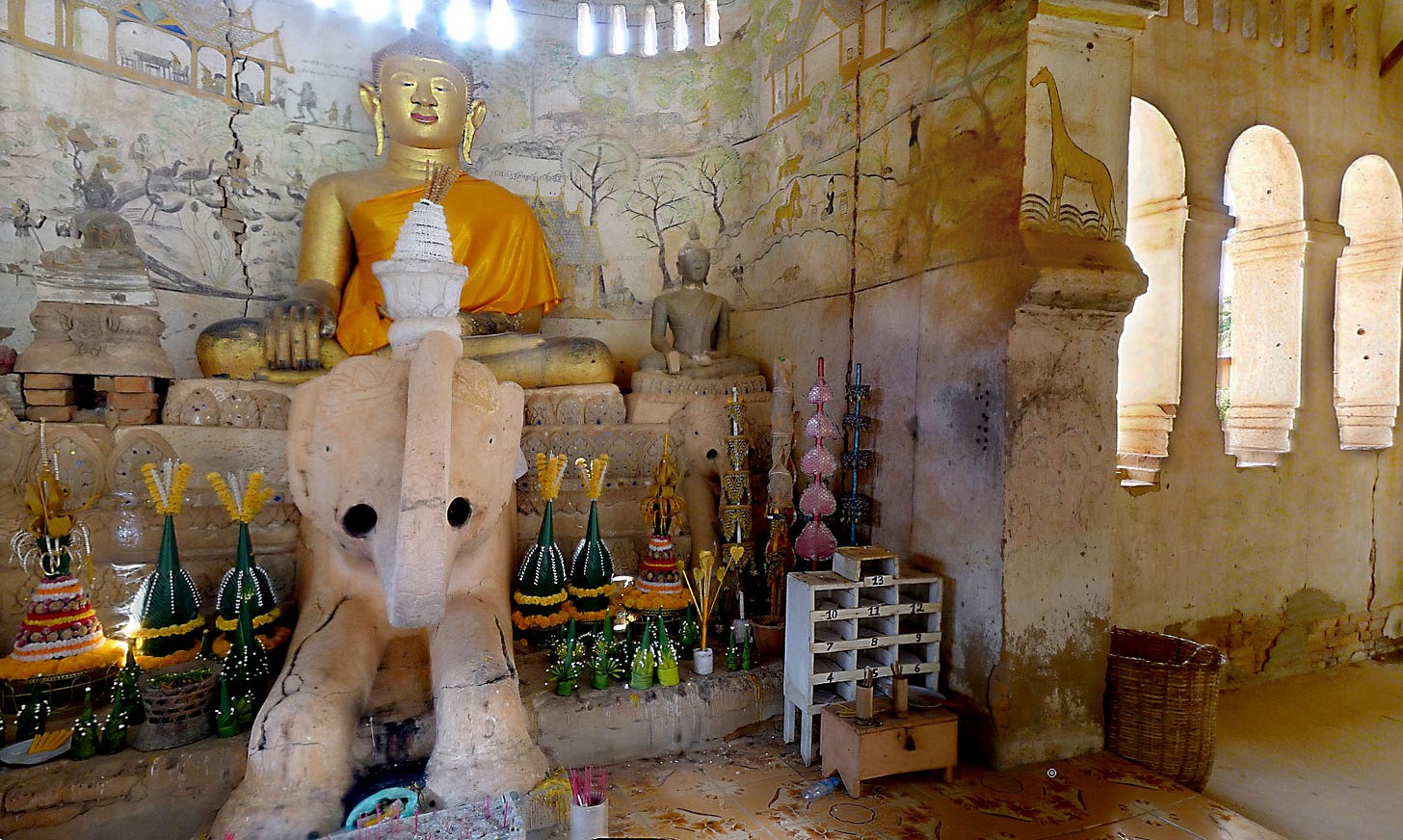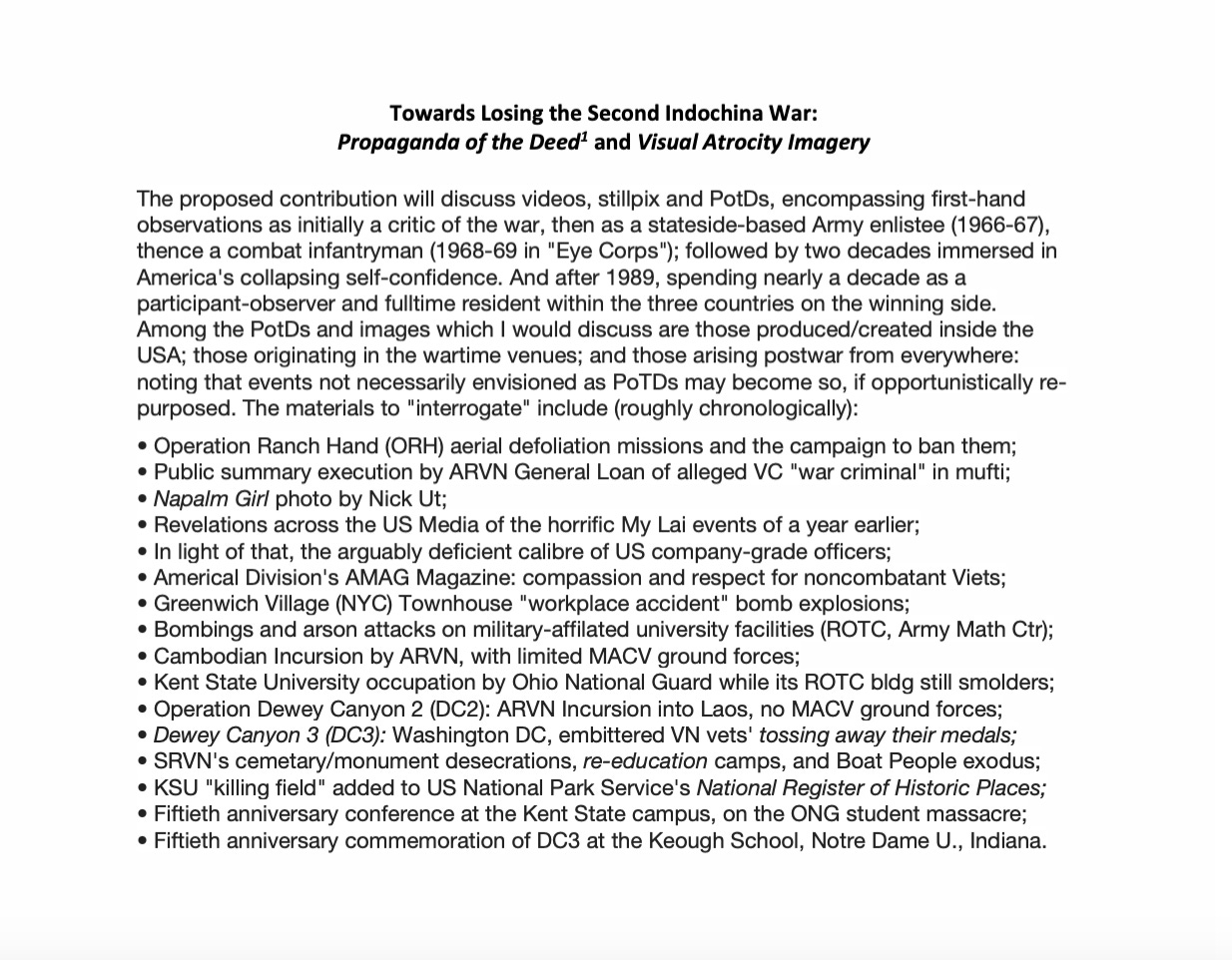
Alan Potkin is a Mekong river conservationist and a combat veteran of the Second Indochina War. Longtime readers will remember his essay about the war, published here in 2019: McNamara’s Morons:
As far as I know, I’m the only affiliated scholar here who actually served as a combat soldier at the height of the Vietnam War (1968-69), and I’m preparing a new eBook much more narrowly focused than usual on the December 17, 1968, crash of a C-123 transport plane just taking off from Chu Lai, Vietnam. Only nine of the 45 crew and passengers aboard survived. One of the fatalities was CPT Morton Singer, a rare Jewish chaplain whom I had met just a month earlier, and who is extremely influential even now on my life choices.
With absolute certainty, the crash happened because the plane’s fuel tanks had just been incorrectly refilled with JP4 jet fuel, rather than the 115-145 octane aviation gasoline that was clearly specified on the aircraft exterior, near the filler port. It was almost unimaginable that the driver of the fuel truck could be so incompetent and irresponsible!
However, in just the last several years it has become more widely known that as result of decisions secretly taken by then-Defense Secretary Robert McNamara and US President Lyndon Johnson, more than 300,000 prospective draftees whose dismal scores on the Armed Forces Qualifying Test were far below the previous acceptable threshold for serving in the US military were enlisted or conscripted. …
Recently, Alan sent me an email telling me that he and his wife Catherine would be in Paris today. He asked me if I’d like to join him and his old friend, Lodewijk Wagenaar, for lunch. Lodewijk, he wrote,
is a Dutch history prof emeritus, cultural anthropologist, and Buddhist Scholar, with whom Catherine and I have worked for several decades (mostly in Sri Lanka and India), specializing in the erstwhile Dutch East India Company’s (VoC) projects in Indonesia and Ceylan. He describes himself as the “VoC’s last servant.” It would be fabulous if you joined us there for that …
Alan’s wife, Catherine Raymond, is another distinguished scholar:
Catherine Raymond received her Ph.D. in Art and Archaeology and in Indian and Southeast Asian Studies from La Sorbonne (Université de Paris III), where she was trained under Jean Boisselier (Thailand, Cambodia, Vietnam); Madeleine Giteau (Cambodia and Laos); and Denise Bernot (Myanmar). She also holds a Diplôme de recherche et d’études appliquées from National Institute of Oriental Languages and Civilizations. Her research largely focuses on the iconography of Theravada Buddhism, with special interest in the arts of Myanmar. Presently, Dr. Raymond is Associate Professor of Art History at Northern Illinois University; Director of the Center for Burma Studies; and Curator of the Burma Collections. She has been developing innovative digital approaches in archiving and conserving heritage sites throughout South and Southeast Asia.
I accepted with pleasure, of course. So today I’ll be meeting three distinguished scholars of South and Southeast Asia, one of whom is also a combat veteran of the Vietnam War.
Alan recently submitted a proposal to the Vietnam War Conference Committee for its March 2023 conference: 1973: The Paris Peace Accords and the Allied Withdrawal from South Vietnam.
“Regrettably,” the organizers wrote back, “we will not be able to accommodate your presentation this year as it falls too far outside the scope of the event.”
I’m a bit mystified by that: How could a proposal be more suitable? I thought it a shame, because it looked fascinating. I told Alan that if he’d already assembled the materials for the presentation, CG would love to have a presentation or an article on the subject. He said we could discuss this over lunch.
So that’s what I’ll be doing today. If it seems appropriate—I don’t know if this would be welcome—I’ll record the conversation for a podcast.
I wonder if you have any questions for them? What have you always wanted to know about Western involvement in Indochina, the art and archaeology of South and Southeast Asia, the Vietnam War (both France’s and the United States’), the experience of the war from a combat infantryman’s perspective, the Paris Peace Accords, the Allied Withdrawal from South Vietnam, cultural anthropology, Buddhism, the American anti-war movement and its legacy, the ecology of the Mekong River, cultural and ecological conservation, or contemporary south and Southeast Asia? Let me know in the comments.
If you’re looking for inspiration, I’ve appended a selection of their thoughts and articles below:
Excavating Orwellian Deconstructed:
All but the ghosts have abandoned the wartime cemetery here. No relatives visit. The monument to honor the sacrifice of the dead stands unfinished. The pagoda for family prayer is empty. Weeds run wild among the graves, and headstones lie toppled. A generation ago, when these boy soldiers died, bereaved mothers encased their photographs in stone markers. Surprisingly, many of the pictures have not faded. The faces—clear-eyed, clean-shaven, proud—much like those of the young men one sees today on the streets of Hanoi.” … Bien Hoa, Viet Nam. David Lamb, Los Angeles Times, 17 July 1998
Digital and Analog Replications in the Restoration Museology of Theravada Temple Art
The Houaphan Menhirs National Archaeological Park, Laos: a work in progress
Notes on a Burmese Version of the Vessantara Jataka, as Represented on three Shwe Chi Doe in the NIU Burma Art Collection
Troubles in Siam: The Last Years of the Dutch East India Company’s Lodge in Ayutthaya, 1760–67
Historical, Ethno-Botanical and Social Aspects of Cinnamon Cultivation in Sri Lanka
The Houaphan Menhirs National Archaeological Park, Laos: a work in progress








I would love to listen to a podcast with them if you can arrange it. Also, it would be great if you could notify CG readers when the ebook comes out and the best way to access it.
I would like to hear a podcast of this as well. I was too young to pay close attention at the time, but I clearly remember my parents discussing the Vietnam War. Father was a veteran of WW2 and Korea, and mother was Dutch; raised in Holland during the occupation. I remember they could get quite animated. Listening to a discussion that touch on that time, including the collapse in American self confidence would be a pleasure. Thanks for the offer.